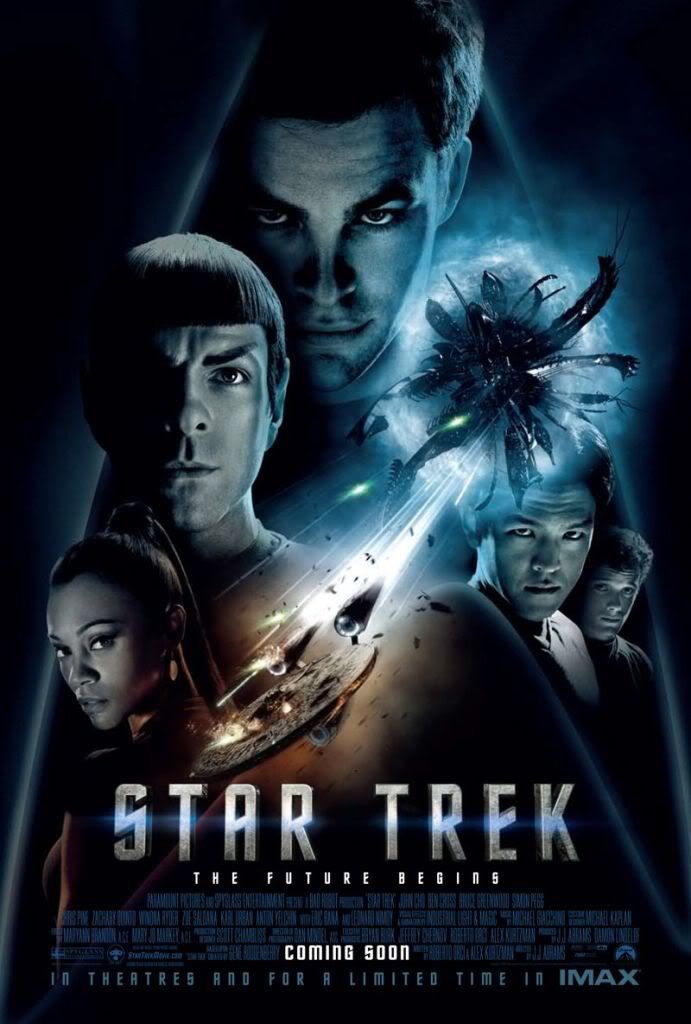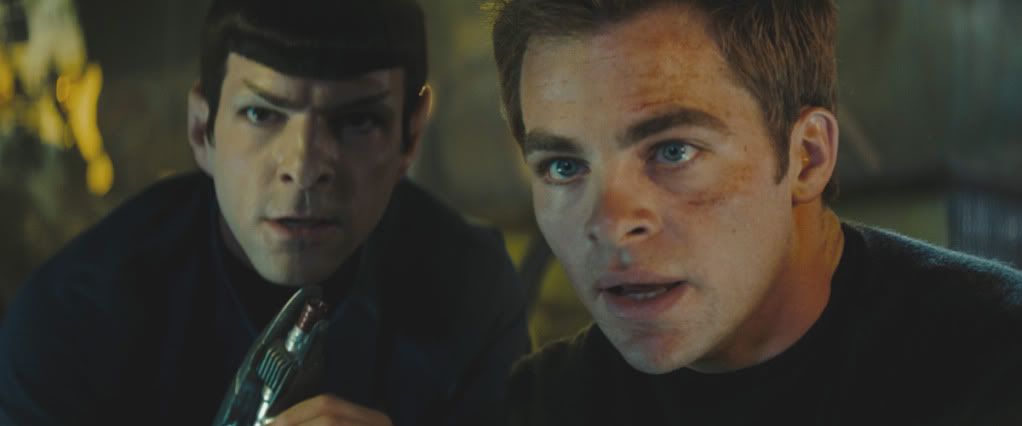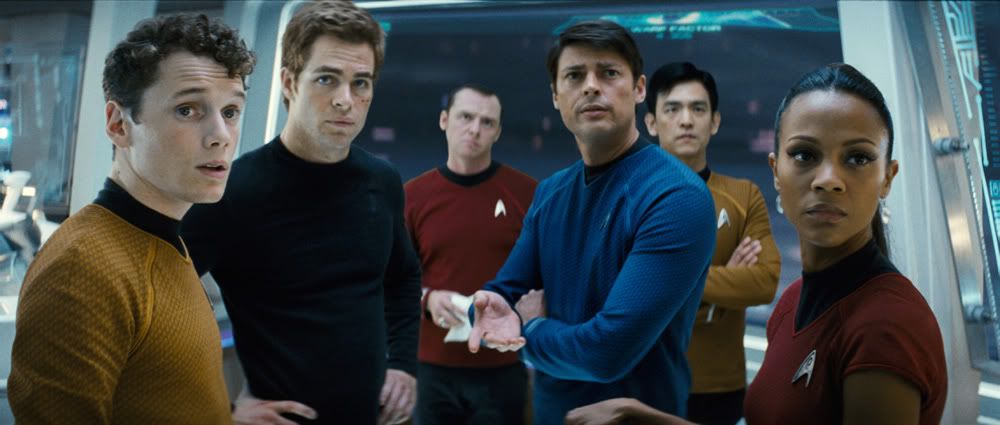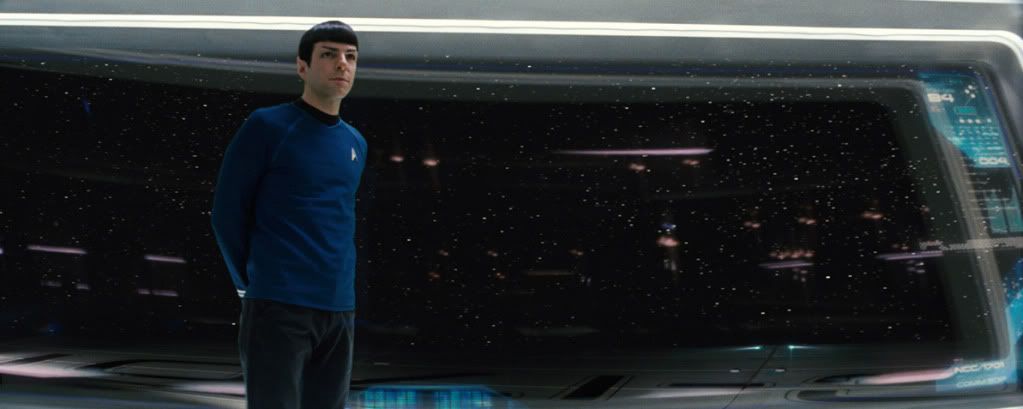 I've been writing about it for months, and waiting anxiously all this time, but the day has finally come! The J.J. Abrams directed film hoped to revitalize the public interest in Star Trek; does it do the franchise justice, or is all hope lost in space?
I've been writing about it for months, and waiting anxiously all this time, but the day has finally come! The J.J. Abrams directed film hoped to revitalize the public interest in Star Trek; does it do the franchise justice, or is all hope lost in space?For those of you unfamiliar, J.J Abrams' Star Trek is the eleventh film in the Star Trek movie franchise, but re-imagines the characters of Gene Roddenberry's original television series. In actuality though, I don't think this is much of a spoiler, the film is a sequel to pretty much the entire Star Trek franchise in that the film's villains, Nero and his Romulan henchman, are from a future yet to be seen in the franchise, but one in which the original Spock, reprised by Leonard Nimoy, existed. The rest of the film however takes place in an alternate timeline from that of The Original Series and subsequent Star Trek films and shows, thanks in part to Nero's tamperings with time. So, for fans, all this is thankfully well explained and shouldn't really interfere with set stories and future films; but for new viewers it won't matter.
 But, if anyone out there wants to read more into the character of Nero and his connection with Spock and Star Trek as a whole, you can pick up the film's prequel comic book, Star Trek Countdown, which not only connects Nero with J.J. Abrams' Star Trek, but Star Trek: The Next Generation as well. I haven't read it myself (though I have skimmed through it) but after seeing the film I certainly plan to pick it up now, if only to get a better understanding of the film and character.
But, if anyone out there wants to read more into the character of Nero and his connection with Spock and Star Trek as a whole, you can pick up the film's prequel comic book, Star Trek Countdown, which not only connects Nero with J.J. Abrams' Star Trek, but Star Trek: The Next Generation as well. I haven't read it myself (though I have skimmed through it) but after seeing the film I certainly plan to pick it up now, if only to get a better understanding of the film and character.As for the film itself, it centers mainly around the lives of James Tiberius Kirk (Christopher Pine) and Spock (Zachary Quinto); in fact they're really the only characters in the film with back stories explained, where as most everyone else gets a few spoken sentences regarding their past. Thankfully, because I found the child portrayals to be rather annoying, Star Trek takes a cue from Abrams' series, Lost, and "Three Years Later" appears on screen, putting all the past behind and jumping right into the story at Starfleet. The rest of the film follows the young Enterprise crew as they learn about one another as they try to defeat Nero; that's just really summing it up though, there's more too it but I'd hate to be the one to spoil it for you.
 Personally, The Original Series is my favorite when it comes to anything Star Trek, so for me I was really interested to see how this new, young cast portrayed the characters I loved. To say the very least I was pleased, but why don't we go into some detail? When most people think of the original Star Trek, they usually think of the trinity of Kirk, Spock, and of course, Dr. Leonard "Bones" McCoy. Portrayed in the film by Karl Urban, I felt that his character was a nice emulation of the same one played by DeForest Kelly, but I don't think he was given the attention he deserved. Yes, the "I'm a doctor, not a ..." lines were intact, and that was nice, but I would have liked to see more of him, as McCoy was my personal favorite from the series. But, as stated before, the real focus is on Kirk and Spock, and both characters portrayals are pretty true to their original counter parts. Pine definitely offers a different side to Kirk than Shatner, but come later in the film, as the character develops, it's the start of the Kirk we've come to love. As for Spock, I don't think anyone could have portrayed him better than Quinto. He had the look, and the attitude, it was spot on and it was great.
Personally, The Original Series is my favorite when it comes to anything Star Trek, so for me I was really interested to see how this new, young cast portrayed the characters I loved. To say the very least I was pleased, but why don't we go into some detail? When most people think of the original Star Trek, they usually think of the trinity of Kirk, Spock, and of course, Dr. Leonard "Bones" McCoy. Portrayed in the film by Karl Urban, I felt that his character was a nice emulation of the same one played by DeForest Kelly, but I don't think he was given the attention he deserved. Yes, the "I'm a doctor, not a ..." lines were intact, and that was nice, but I would have liked to see more of him, as McCoy was my personal favorite from the series. But, as stated before, the real focus is on Kirk and Spock, and both characters portrayals are pretty true to their original counter parts. Pine definitely offers a different side to Kirk than Shatner, but come later in the film, as the character develops, it's the start of the Kirk we've come to love. As for Spock, I don't think anyone could have portrayed him better than Quinto. He had the look, and the attitude, it was spot on and it was great. As for the rest of the cast, Uhura (Zoë Saldana) was given more prominence this time around than in The Original Series, and the fact that she was marketed alongside Kirk, Spock, and Nero in promotional materials now makes more sense after seeing the film. Her performance is not ground breaking, but she doesn't ruin the already developed character, she just adds a little bit more to her. Then there's the forgotten ones, not forgotten in terms of no one liking them, but these guys just really have no attention or development in the film. I'm talking mainly about Pavel Chekov (Anton Yelchin) and Hikaru Sulu (John Cho), the former of which didn't even appear in The Original Series until its second season, so his inclusion now is a bit odd, but maybe it has to do with the whole "alternate timeline" aspect, but your guess is as good as mine. The character of Chekov is still comedic in his lack of being able to pronounce "v" but he really felt unnecessary; I also don't get why he has to have curly hair now but ... whatever. As for John Cho as Sulu, he gets his one scene in the spotlight and that's pretty much it for the film; and he doesn't have George Takei's voice, but then again, who does?
As for the rest of the cast, Uhura (Zoë Saldana) was given more prominence this time around than in The Original Series, and the fact that she was marketed alongside Kirk, Spock, and Nero in promotional materials now makes more sense after seeing the film. Her performance is not ground breaking, but she doesn't ruin the already developed character, she just adds a little bit more to her. Then there's the forgotten ones, not forgotten in terms of no one liking them, but these guys just really have no attention or development in the film. I'm talking mainly about Pavel Chekov (Anton Yelchin) and Hikaru Sulu (John Cho), the former of which didn't even appear in The Original Series until its second season, so his inclusion now is a bit odd, but maybe it has to do with the whole "alternate timeline" aspect, but your guess is as good as mine. The character of Chekov is still comedic in his lack of being able to pronounce "v" but he really felt unnecessary; I also don't get why he has to have curly hair now but ... whatever. As for John Cho as Sulu, he gets his one scene in the spotlight and that's pretty much it for the film; and he doesn't have George Takei's voice, but then again, who does?Lastly, Montgomery Scott (Simon Pegg), first off he doesn't even appear until much later in the film, and he really didn't seem to be the same Scotty that James Doohan played; once again you could bring up the "alternate timeline" aspect, but there definitely seemed to be something lacking from his character. Oh, and I can't forget Nero (Eric Bana); he's not the most memorable of Trek villains in terms of something that makes him unique, and there's really no compassion for the character, try as the writers might though. In the end he just works to drive the story along, and he obviously poses a threat, being that he is the sole causer of the alternate timeline. He's no Khan though, to say the least. Last note, Nimoy definitely stole the show me, to say the least, just thought you should know. (Trekgasm)
 With the acting out of the way it's time to talk about the rest. One thing I noticed a lot, lense flares and awkward camera movement. Like, I don't think there's a two minute gap without some sort of flare effect; not that big of a deal, but it is noticeable. As for awkward camera angles, there's a few times where the image is literally on its side and then will twist and turn to set itself normal; once again not something that bothered me that much, but those prone to motion sickness may want a bag at hand. And then there's the soundtrack. The orchestrated pieces are brilliant, and the track that recreates the original theme gave me goosebumps in a good way. But there's one scene that used the Beastie Boys' track, "Sabotage", and it just seemed really out of place for the 23rd century.
With the acting out of the way it's time to talk about the rest. One thing I noticed a lot, lense flares and awkward camera movement. Like, I don't think there's a two minute gap without some sort of flare effect; not that big of a deal, but it is noticeable. As for awkward camera angles, there's a few times where the image is literally on its side and then will twist and turn to set itself normal; once again not something that bothered me that much, but those prone to motion sickness may want a bag at hand. And then there's the soundtrack. The orchestrated pieces are brilliant, and the track that recreates the original theme gave me goosebumps in a good way. But there's one scene that used the Beastie Boys' track, "Sabotage", and it just seemed really out of place for the 23rd century.Overall, J.J. Abrams and his crew, not to mention the cast, really have brought Star Trek to a new audience and generation. Not to mention that it's certainly the flashiest, most engaging, and even the most welcoming Trek film to date. The "alternate timeline" allows new viewers to get into the series, while Trekkies and casual fans will be able to sleep at night knowing their original characters are safe in their own timeline. Not that it's a bad thing, but time travel can cause a whole lot of continuity issues, so I was glad to see the writers figured out a way to get it done right. Let's just hope everyone else can agree that this crew is the right way to bring Star Trek back as well.
Overall Score: 9.3/10


























1 comment:
that it does, thanks for commenting!
Post a Comment